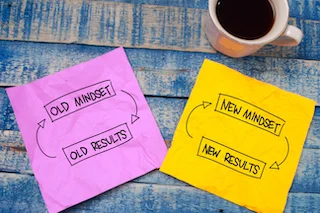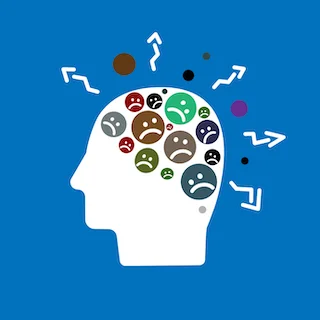Monday, July 15, 2019
welcome to the leADDership brief
A weekly newsletter for creative and innovative people, like you, with ADHD who want timely, helpful, and interesting resources
for leading and living well with ADHD.
How Being Kind and Compassionate
With Yourself
Can Help You Manage and Save Time
In 2011 I left a job I loved but where the environment had become particularly toxic for me.
I spent months after leaving beating myself up, examining and re-examining what I could have done better, how I could have been better, what was wrong with me, and picking apart all of my shortcomings. I blamed myself for everything and as an adult with ADHD I was well versed in my "shortcomings and failures." I was very aware of all the times I was late for meetings, meeting a deadline, or impulsively said said something I would later regret.
It was an energy draining time-suck.
Except that it led me to authors and ideas I had never before explored.
LIke Dr. Kristin Neff's groundbreaking book "Self-compassion: The Proven Power of Being Kind to Yourself"
I first heard Brene` Brown refer to Dr. Neff's work in her iconic TED talk on vulnerability, I was intrigued and immediately ordered the book.
I read Dr. Neff’s book because I wanted to understand self-compassion as a way of healing the pain I was experiencing from leaving my job and the sense of failure I was drowning in.
The unexpected bonus has been how much embracing these concepts has helped me with my biggest ADHD roadblock: TIME.
If only I had a dollar for every time I was late and spiraling down the time-shame cycle, apologizing or making up excuses for my tardiness, I'd be a rich lady!
For today I want to talk with you about the power of self-compassion and kindness and how it can help you as an adult with a beautiful and neuro-a-typical ADHD brain use time better.
How changing your mind about yourself, how you talk to yourself, and how you treat yourself where time is concerned will get you new and better results.
What is Self-compassion and Self-kindness?
On her website Dr. Neff defines it as the following:
“Having compassion for oneself is really no different than having compassion for others. Think about what the experience of compassion feels like. First, to have compassion for others you must notice that they are suffering. If you ignore that homeless person on the street, you can’t feel compassion for how difficult his or her experience is. Second, compassion involves feeling moved by others’ suffering so that your heart responds to their pain (the word compassion literally means to “suffer with”). When this occurs, you feel warmth, caring, and the desire to help the suffering person in some way. Having compassion also means that you offer understanding and kindness to others when they fail or make mistakes, rather than judging them harshly. Finally, when you feel compassion for another (rather than mere pity), it means that you realize that suffering, failure, and imperfection is part of the shared human experience. “There but for fortune go I.”
Self-compassion involves acting the same way towards yourself when you are having a difficult time, fail, or notice something you don’t like about yourself. Instead of just ignoring your pain with a “stiff upper lip” mentality, you stop to tell yourself “this is really difficult right now,” how can I comfort and care for myself in this moment?
Instead of mercilessly judging and criticizing yourself for various inadequacies or shortcomings, self-compassion means you are kind and understanding when confronted with personal failings – after all, who ever said you were supposed to be perfect?”
A New Attitude
As adults with ADHD time-management has often been as mysterious and illusive as landing on the moon. We either overshoot the moon or never get out of earth's orbit.
We know time exists, we understand that time is seconds, minutes, hours, days, months, years, etc. And yet our beautiful ADHD brains struggle to land successfully in the time-space continuum which leads to constantly beating ourselves up for our time-management missteps and imperfections.
All the critical and negative self-talk hasn't and won't change how we experience time. In fact, negativity and self-criticism creates stress, our bodies release cortisol as a defense against stress, which in turn increases anxiety and brain fog and lowers dopamine. We experience a time paralysis and our brain signals us to get away from the perceived threat causing us to distract ourselves with something less threatening and more interesting in the moment. The result is we often forget what we were doing and why we were doing it. This is a perfect storm for the adult with ADHD.
From Dr. Neff: “You may try to change in ways that allow you to be more healthy and happy, but this is done because you care about yourself, not because you are worthless or unacceptable as you are. Perhaps most importantly, having compassion for yourself means that you honor and accept your humanness. Things will not always go the way you want them to. You will encounter frustrations, losses will occur, you will make mistakes, bump up against your limitations, fall short of your ideals. This is the human condition, a reality shared by all of us. The more you open your heart to this reality instead of constantly fighting against it, the more you will be able to feel compassion for yourself and all your fellow humans in the experience of life."
One of the most important things I’ve learned from Dr. Neff’s book is that when I change my behavior because it is good self-care and honors who I am, how I was created, and how my ADHD brain works I actually have more bandwidth and ability to manage time better, take personal responsibility, and look for creative solutions.
Below are three self-compassion exercises from Neff’s book that I’ve adapted to meet my and my client’s time-management needs:
Empathic breathing and soothing touch
Speaking kindly to yourself about yourself
Taming your inner critic
The Five Time Saving Benefits of Self-compassion and Kindness
Resiliency: Self-compassion and kindness builds resilience and self-awareness so that we are better equipped to be honest with ourselves. We don’t allow our ADHD challenges to define us. We know what we need, what we don’t need, and when it’s time to reach out for some extra help. The self-aware are good at listening to the subtle cues their body and their mood are sending., This gives you language to advocate for yourself effectively and efficiently with bosses, colleagues, spouses, friends, and children to make the changes necessary to complete a task or project.
Recovery: Self-compassion and kindness increases our ability to learn and be agile when we have to pivot and recover from a time-shame spiral and overwhelm. They also create space and opportunity to soften our hearts and minds in the midst of overwhelm and to see what can be done to change things, or to find the wisdom to accept what cannot be changed
Re-focus: Studies show that breathing and soothing touch improves our ability to control our attention by helping to strengthen our ability to self-observe, to train attention, and to develop different relationships to our stressful time-management experiences. In other words, it teaches us to pay attention to paying attention. This saves us time by helping us re-focus our attention and get back on track or stay ahead of the clock.
Re-setting: According to Dr. Neff “self-compassion allows us to be more objective about our situation, thoughts or emotions, and can help us have a more balanced perspective.” Self-compassion increases our emotional, cognitive, and attention bandwidth so that we can take a breather, step away from the moment, and reset our attention and focus on the task at hand. know we are NOT ADHD, we are adults with ADHD and we get a do-over.
Responsibility: Research supports the claim that self-compassion leads to taking more, not less responsibility for our actions. Self-compassionate people are more likely to feel guilt (a sense of remorse and the desire to make amends) rather than shame (a negative evaluation of one’s worth as a person) about past offenses. Because self-compassion builds resilience we are equipped to apologize for their mistakes not for being. This gives you language to advocate for yourself effectively and efficiently with bosses, colleagues, spouses, friends, and children to make the changes necessary to complete a task or project.
#1 Breathing and Empathic Touch
Studies show that deep breathing can help reduce stress, improves attention, and can enhance cognitive performance, such as during attention, memory, and executive functions. Want to know more? check out this article
A soothing touch or a warm, empathic hug activates the care system and parasympathetic nervous system to help us calm down and refocus our attention. Our bodies and nervous systems do not know the difference between our own soothing touch or that of another person giving us understanding and an empathic hug. It simply responds to the comfort and compassion.
I confess, it felt a little weird at first to do this, but the return on the investment has been worth it. It's also the simplest and quickest way to mitigate the cortisol that may be swimming in our bodies due to a time overwhelm. Studies show that we release oxytocin in response to soothing touch and oxytocin can induce anti-stress-like effects such as reduction of blood pressure and cortisol levels. This allows us to calmly, without shame, reassess the time situation we are in with a more objective perspective.
The next time you find yourself in a difficult time-management situation and you feel the overwhelm coming on stop and do the following:
Take a three deep cleansing breaths, in deeply through the nose, expand your diaphragm, hold it four counts, exhale four counts. Repeat.
Place your hand on your heart, or give yourself a hug, or gently hold your forearms
Feel the warmth of your hands, the gentleness of your touch
Notice your heart rate beginning to slow down, the tension leaving your body
Stay with this feeling for a few moments
Notice the calm in your body
Sit, or stand, with the calmness. How does it feel? What is it saying to you? What does it look like?
Now, re-focus and re-set your attention on what the very next, most simple, step, would be to get back on track.
#2 Speak Kindly to Yourself and About Yourself
As adults with ADHD we are all too aware of our shortcomings, the balls we've dropped, the appointments we’ve missed, the people we've let down, the projects we've started or never finished. We've become adept at beating ourselves up for things we cannot control because of time blindness and our short time horizon
All the harsh words and bullying ourselves only serves to increase our stress and cortisol levels.
To do this exercise think of a time scenario in your life that has or is causing you stress. Perhaps even sends you into the shame-time spiral. Read more about the shame spiral here
If you're a visual learner, imagine the last time this happened.
If you are an auditory learner, tell yourself the story of what happened.
Notice where the the stress and emotional discomfort is residing in your body.
1. Be mindful and remind yourself that was a moment of suffering, it hurt, it was painful, you feel ashamed, etc. (Tell yourself the story, imagine the scenario, feel the story)
Remember, compassion is to “suffer with,” and before we can act kindly we need to admit that we are suffering. (Not third-world suffering of course, it’s not a comparison, it’s just a fact of suffering you are addressing and caring for).
2. Remind yourself that suffering is a part of life--part of being human--other people feel this way about time too--I’m not the only one--everyone has something they struggle with
Now, put your hands over your heart, hold your elbows in a hug, or gently rub the back of your neck, feel the warmth and gentleness of your hands.
Now ask yourself:
3. How can I be kind to myself?
If you're an auditory learner ask yourself, “What do I need to hear right now to express kindness to myself?” Say those words out loud to yourself.
If you're a visionary learner ask yourself what kindness looks like. Close your eyes and imagine doing an act of kindness for yourself.
If you’re a kinesthetic learner ask yourself what kindness feels like. Close your eyes and imagine that kindness and feel it in your body.
This practice can be used any time of day or night, and will help you to build emotional resilience and help you to pay attention to what you are paying attention to.
#3 Taming Your Inner Critic
Dr. Neff recommends doing this exercise over several weeks so that you can form the blueprint for changing how you relate to yourself long-term.
If you are a visual or kinesthetic learner you may want to keep a journal or a notebook you can write, draw, paint, or collage in to record your thoughts and insights.
If you are an auditory learner you may want to keep a voice-recorded journal.
Do what works for you. I have a client who is an amazing artist and he created a cartoon strip to capture his thoughts. I love to journal but need lots of sharpies, pens, and post-it notes because I like to color code, doodle, and otherwise enhance my words.
The first step towards changing the way we treat ourselves is to notice when we are being self-critical about time. It may be that your inner critic’s voice is so normal for you that you don’t even notice when it is present. Try this:
Whenever you’re feeling bad about time, notice what you’ve just said to yourself about yourself. Try to be as accurate and honest as possible.
What words do you actually use when your inner time critic is speaking? Are there key phrases that come up over and over again?
What is the tone of your inner critic’s voice – harsh, cold, dismissive, angry?
Does your inner critic’s voice remind you of any one in your past who was critical of your time-management skills?
You want to get to know the inner critic very well, and to become aware of when your inner judge is active. For instance, if you’ve just missed another deadline, does your inner critic say things like “you’re so lazy,” “you’re so disorganized,” “you suck,” or “you’re the worst,” for example?
Do what works for you to capture the words, voice, tone, phrases, etc. of your inner critic. Record, write, doodle, draw, post-it notes, etc.
Make an active effort to soften your inner critic’s voice, but do so with compassion rather than self-judgment. For example:
“Hey, inner critic, I know you’re worried about me and feel unsafe, but you are causing me unnecessary pain and stress right now. Could you let my inner compassionate self say a few words now? Could we change this inner narrative to something more helpful, creative, and productive?
Re-frame the observations made by your inner critic in a friendly, positive way. If you’re having trouble thinking of what words to use, you might want to imagine what a very compassionate friend would say to you in this situation. Use warm and friendly words. For example:
“Friend, I know you missed that deadline again and you’re feeling overwhelmed and ashamed by this. I know that speaking harshly seems like the right thing to do because it’s your normal. But you feel even worse, more paralyzed, and are actually making the situation harder when you bully yourself. I want you to be happy, I want you to succeed at this, I want you to access your amazing problem solving skills so why don’t you take a some deep breaths and maybe a 15 minute break to re-set?”
While engaging in this supportive self-talk, you might want to try a gentle empathic hug, stroking your arms, putting your hand over your heart, or gently rub the back of your neck. Remember, gestures of warmth can tap into the care giving system releasing oxytocin that will help lower cortisol and relieve the overwhelm.
As you begin to tame your inner critic and find your inner advocate you will access and enable an ability to make strategic changes that will help you manage your time. You will also find that you are meeting more deadlines and meetings on time! You are showing up as the best version of yourself for yourself and others.
Auditory Learner? Click on the link below.
Coach Pam












